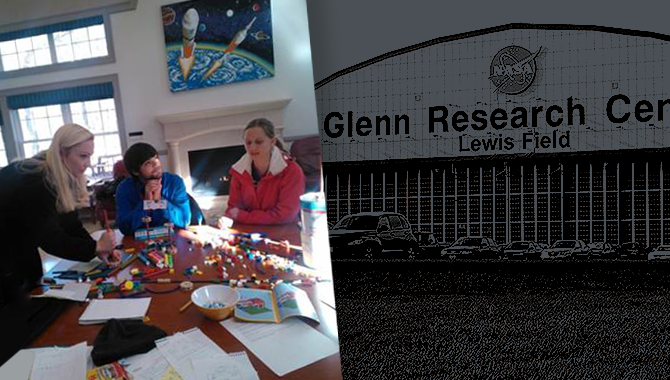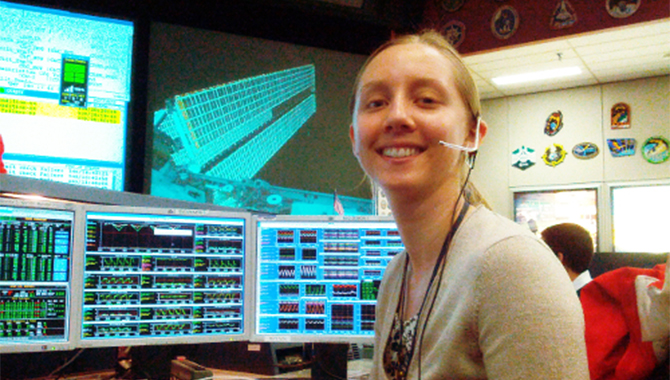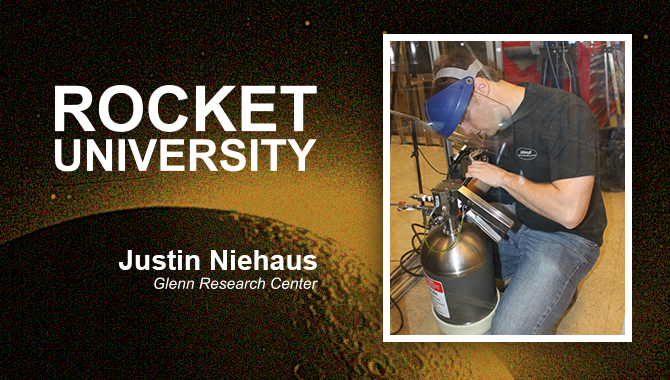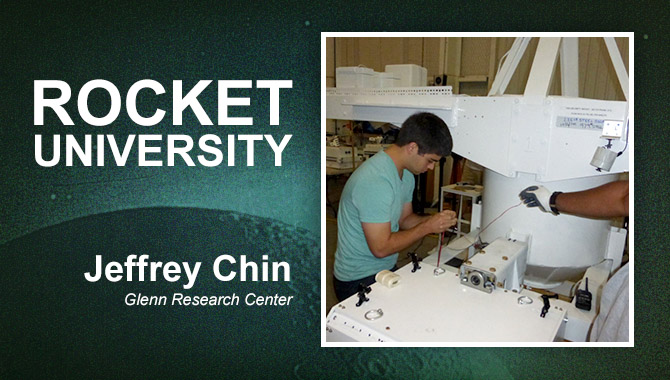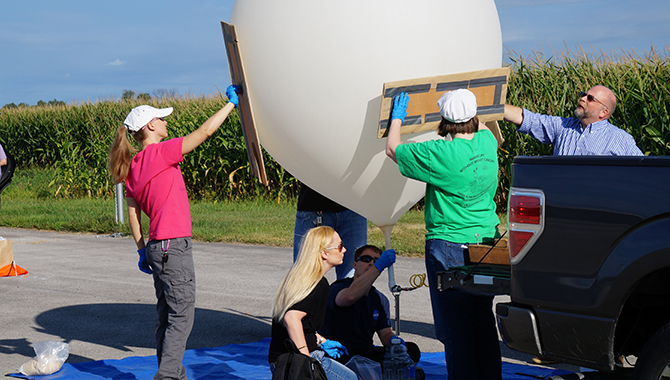
Members of Glenn Research Center’s pilot Rocket U program prepare the balloon for their flight project. From left to right: Kristen Bury, Amanda Stevenson, Justin Niehaus, Deb Goodenow, and Dave Wolford. Behind the balloon: Fransua Thomas.
Photo Credit: Anthony Roberts/NASA
Glenn Research Center’s Rocket University pilot program melds course work with hands-on experience to give early-career engineers a strong foundation for the future.
In November 2013, Glenn Research Center (GRC) launched its pilot Rocket University (“Rocket U”) program. Since then, 12 early-career employees have been immersed in courses, seminars, applied laboratories, and mentoring interactions designed to give them the knowledge they need to take a Rocket U project through its full lifecycle. APPEL News sat down with four members of GRC’s Rocket U program—Kristen Bury, Jeffrey Chin, Justin Niehaus, and Matthew Smith—to find out how the program’s courses are supporting their work at NASA.
APPEL News: What kinds of Rocket U workshops have you done so far?
Matt Smith: Just this past Friday we attended a workshop with structural dynamics branch members here at Glenn. It was an introduction to what that group does and also a quick overview, by some of the experts here at the center, of how you do vibration analysis of a project. We got to see the labs here at the center and some of the resources available, and talked about the actual process of testing. We asked questions like, “How do you do vibration testing?”, “How does vibration testing work for a spaceflight project?”, and “What are some of the best practices for vibration analysis?”
APPEL News: How do the workshops relate to your Rocket U project?
Jeffrey Chin: It seems like a lot of the teachers are tailoring [the workshops] toward how we can incorporate the knowledge we get into our project. The classes were heavily front-loaded at the beginning but they’re starting to taper down now. Subjects span everything you’d want to know about project management to technical stuff as well.
Justin Niehaus: The front-loaded workshops have mostly been the APPEL project planning ones. They’ve been very useful since we had to start planning as early as possible. We’ve learned things such as: “What do you need to get out of a Systems Requirements Review (SRR)?”, “How do you know you’re ready for an SRR?”, “When do you do a Critical Design Review (CDR)?”, and “How do you write requirements?” We had a week-long course on requirements alone. While that workshop was a while ago, we did walk away with a lot of materials from it, which is great. We’re in the middle of writing the requirements for our [Rocket U] project now and we have a lot of useful literature to refer back to.
APPEL News: Have the workshops introduced you to information or concepts you were unfamiliar with?
Kristen Bury: My background is in chemical engineering and electrical engineering. So I’ve had very little exposure to things like structural dynamics, and I haven’t had any hands-on mechanical engineering experiences. In the vibration workshop last week, they had a shaker table set up with a cantilever attached to it. They kept shaking it faster and faster so we could see the impact that the rate of vibration had on the cantilever. At certain frequencies, the cantilever experienced significant deformations. It was interesting to see the actual visual of what vibration analysis is for and why it’s needed. I’d never seen that in practice prior to going to the workshop. It was a very cool learning experience.
APPEL News: The vibration test workshop sounds interesting. Can you tell us a little more about how it helped you?
Smith: One of the nicest things about the workshops we’ve been doing is I’m learning how things are actually applied in a spaceflight environment. As a mechanical engineer, I have a background in a lot of these subjects. But I’ve never done an actual vibration test. I’ve only had the theory. So it was really interesting to actually see how a test is set up. My exposure to a lot of these tests so far has been as an item on a schedule. As in, vibration testing takes two weeks on a particular schedule. It was very enlightening to be able to see and talk to the people who run the tests, or get a visual picture of what they‘re going to be doing, how they’re going to do it, why it takes that much time, things of that nature. That was the best part of the most recent workshop: understanding exactly how it’s done here, how the theory is applied.
APPEL News: Has there been anything that surprised you in these workshops?
Niehaus: The biggest surprise to me was discovering that we need to consider risk very early on. I thought that was something that you got into when you started to design. But it turns out we need to be designing earlier, at least having the concept in our mind. Then, as we go through the design phase, we need to be able to think of all the things that could go wrong and rank them as early as possible. So from a planning stand point that’s something. We’re learning why we jump through all these hoops that seem annoying, seem like they slow us down. There are important reasons for everything we need to do.
APPEL News: What are some of the benefits you’ve gotten from the Rocket U program so far?
Niehaus: My NASA background is research but my schooling background is engineering. This program has helped me be able to work both on the research side and on the engineering side; to be able to talk to safety and mission assurance as well as project managers and be aware of who I’m talking to and what they’re trying to get out of every conversation.
Smith: I’ve been here 11 months now—which seems like a long time to me but is miniscule compared to everyone else here. NASA has a lot of resources, internal education resources. But one of the things I’ve appreciated most about being in the Rocket U program is there’s a curriculum that was thought out by people who spent a lot of time figuring out the best order in which to learn the NASA processes. And I think that’s been really helpful. I’ve taken other classes, other APPEL classes that have come to the center and also online training, but sort of ad hoc. It’s been really nice to have things flow [in Rocket U]: first we’re going to talk about project management, then requirements development, then we’re going to talk about project processes… It makes sense to take classes in the right order because then we understand why we’re doing something. For instance, I know what to do when I’m writing my requirements, and I will do a better job at that because I know how to validate those requirements later on. So how the curriculum is set up really helps with the learning experience. That’s one of the biggest things I appreciate about the Rocket U program: it really helps direct me toward the resources that are available. Another great thing is meeting people at the center who are tremendous resources. There are so many people at the center who have amazing talents. But you don’t normally get to meet them in your day-to-day job unless you happen to be working with them on a project. It’s really great to be building that network so early in my career.
Chin: It’s definitely like a safety net of experiences. No matter what problem you’re attacking, you’re not starting completely from scratch. You’ll always have someone you can talk to or some other learning resource available at the center.
APPEL News: Has Rocket U introduced you to anything that you might not otherwise have had the opportunity to experience this early on in your NASA career?
Chin: We’re getting a whole network and resources we wouldn’t have had otherwise. We’ve come back with binders of resources from each of the workshops we’ve finished in training. Plus, we’ll still have all of our connections after we finish Rocket U. Moving forward, we’re going to run into a lot of the same issues we ran into in our Rocket U programs. Or we’ll need specific expertise, and we’ll now know where [to find that expertise] at the center. So we’ll have a lot of references and a big network to fall back on in the future.
Bury: In terms of exposing me to things that I probably wouldn’t have gotten exposure to this early on, it’s kind of like a sand box where we can just go and play. It’s a very safe environment. We’re discovering new technical things, we’re also exploring project management-type things. For instance, I got to be project manager for a month. We rotate that responsibility. So I learned more about how to interact with team members and how to assign work to people, including good ways to assign people work versus not-so-good ways. Being able to learn in a safe environment is really awesome. Because on a real project, if you make a mistake, it could be detrimental. But in Rocket U, if you make a mistake, you learn from your mistake and then pick up the pieces and keep going. So it’s been great.
APPEL News: How has Rocket U impacted your day-to-day work?
Bury: The course work has been impacting my day-to-day work a lot in terms of exposing me to technical areas where I didn’t have any kind of a background before. A lot of times I’ll be reading through design documents for solar arrays or something, and I’ll come across this structural information or software-related information. In the past, I didn’t understand what it was. But now this little light bulb goes off in the back of my head that says, “Oh, yeah, we had a class on this! This is what they’re talking about.” It’s really broadened my technical base a lot.
APPEL News: Is there anything about your Rocket U experience that you’d like to add?
Chin: It’s a really good feeling knowing how much time they’re investing in us, helping us learn. Obviously, knowledge transfer is a really important part of NASA these days with the different generations we have here.
Bury: I think we’re really fortunate to have so much support from our center for this program. Our systems engineering group is putting together a board of systems engineers for our SRR. I was floored when somebody told us that. And we have a systems engineer at our disposal at all times. She has a day job but she also comes and helps us. We have a meeting with her once a week where she comes and talks with us about the continuing process. Every time we go to an in-house seminar, we get a new mentor and person we can work with or go to for help. And it’s not just the technical workforce. We also have our management support. We got to present our project to our director’s senior management team, so we have them onboard and wanting to help us. It’s just been fantastic how much support we’ve had from our center leadership and also from our co-workers.
Learn more about Rocket University.






